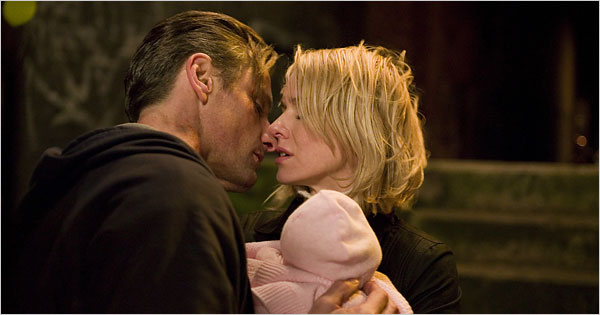Movie review by Greg Carlson
Arguably more brilliant than “A History of Violence,” David Cronenberg’s “Eastern Promises” proves one of the year’s most compelling, engaging, and sharpest films. The movie’s Christmastime setting in contemporary London conjures a thoroughly fascinating otherworld of Russian transplants who count themselves members of the “vory v zakone,” a crime organization that translates to “thieves in law.” After a young prostitute dies giving birth, the diary she leaves behind compels hospital midwife Anna (Naomi Watts) to seek out information that might lead to the infant’s family. Instead, the miserable document delivers her into a den of wolves.
Cronenberg continues his late tradition of closely examining murderous impulses within a familial setting, and the result verges on the spectacular. The Russian gangsters, led by calm but menacing Semyon (Armin Mueller-Stahl) are as perfectly drawn as any of Scorsese’s dynastic concoctions, and the jealousies, power plays, and intimacies that link Semyon’s weak, sadistic, and out-of-control son Kirill (Vincent Cassel) with his confidante Nikolai (Viggo Mortensen, in a career-best performance) are utterly Shakespearian. As the movie alternates between Anna’s precarious foray into the mobster’s universe and Nikolai’s emerging depth, Cronenberg reveals layer after layer of thought-provoking insight into their respective worlds.
Some viewers will cover their eyes during Cronenberg’s signature episodes of lightning-bolt violence. Once again equaling or bettering Scorsese, the director settles his camera on several tremendously unsavory, nearly hideous, moments of intimate mayhem. As gunshots to the head were to “The Departed,” razors to the throat are to “Eastern Promises.” A slippery, steamy hand-to-hand combat sequence in a Turkish bath draws gasps from the audience, and Cronenberg documents a variety of gangland traditions with the clinical gaze of a coroner. Like many of his other films, the violence operates in service to the story, and not the other way around.
As the taciturn Nikolai, Mortensen completely runs away with the movie. In one of the film’s many standout scenes, Nikolai, stripped to his underwear, stands tall before the council of bosses who will decide whether or not to fully embrace him as one of their own. They read aloud the story told by his prison tattoos, and ask him to renounce his father. Nikolai explains that he has been dead since the age of fifteen, and in a line that sends a crawling chill, says “Now I live in the zone all the time.” Mortensen himself is in the zone as well, playing Nikolai as if he is someone the actor has known his whole life.
Working from an original screenplay by Steven Knight, Cronenberg strikes an almost perfect balance between the emotional drama of the central characters and the intricate machinery of the Russian mafia. With a master’s sense of timing and pacing, Cronenberg finds all sorts of beautiful ways to express thoughts about the cycle of life and death, the toll of being a stranger in a strange land, and the secrets that can simultaneously enable and restrict us. “Eastern Promises” is a movie that inspires thought long after one leaves the darkness of the theater, and should not be missed.
